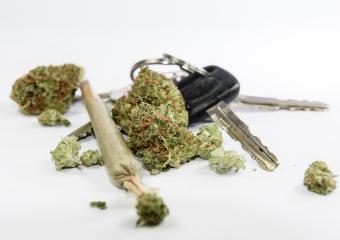Drug driving: what is it?
Driving while under the influence of drink or drugs has been a criminal offence for several decades but in March 2015, section 5A of the Road Traffic Act 1988 came into force, which outlawed driving while the level of certain drugs exceeds the specified limit. To prove an offence under the old law, the prosecutor would have to show that your use of a drug had impaired your ability to drive. Section 5A modernised the law to introduce a drug limit above which a crime is committed.
The law covers six drugs, some of which are illicit, but some also have medical uses. They also included a substance called benzoylecgonine (or BZE), which is a compound produced in the body as cocaine is metabolised. The drugs and their limits are:
|
Drug |
Legal driving limit |
|
Tetrahydrocannabinol (THC), which is the psychoactive ingredient in cannabis |
2 microgrammes per litre of blood (µg/L) |
|
Cocaine |
10 µg/L |
|
BZE |
50 µg/L |
|
Amphetamines |
250 µg/L |
|
Methamphetamine |
10 µg/L |
|
MDMA or ecstasy |
10 µg/L |
|
Ketamine |
20 µg/L |
Unlike alcohol, the drug driving limits have not been set at the point that Parliament felt driving would be impaired – in fact an expert panel formed by the Department for Transport recommended much higher limits for all the drugs. Instead, these limits are set at what is thought to be the lowest point the drug can be in a person’s body without it having got there innocently, e.g. by breathing second-hand smoke.
Sentencing for drug driving is less consistent than it is for drink driving due to the lack of a formal guideline from the Sentencing Council; however, broadly speaking where the offence is not aggravated, e.g. by a crash or previous convictions, then a convicted defendant can expect a driving ban of 12 to 22 months and a fine. Where there are aggravating features to the offence then the court is likely to impose a ban of up to three-years and could send a defendant to prison. If the previous conviction is within the past 10 years, then the driving ban will be at least three-years and could be considerably longer.
While drink drivers can have their ban reduced if they complete the drink driving awareness course, there is not such course for those convicted of drug driving and thus it is not currently – as of July 2020 – possible to reduce the length of your driving ban by completing a course. Your solicitor should be asking the court to reflect that fact when they impose the driving ban as part of the mitigation put forward for you.
In terms of defending these allegations there is a lot that can be done. There are the usual defences that can be run in drink driving cases, such as looking to undermine the evidence that you were driving – if it exists at all, we have seen a number of cases where the only evidence that our client drove is in the form of inadmissible hearsay – or contest the procedure undertaken by the police to obtain the blood specimen. In addition, as all drug driving cases involve blood tests it is always worth investigating whether they have been conducted properly and double checking the evidence of the prosecution experts to ensure they comply with the Criminal Procedure Rules and are admissible in evidence and that’s before we get our own experts to review the evidence to ensure it makes scientific sense.
To give you a couple of examples. We had a case in which our client tested positive for MDMA but insisted she had never taken that drug in her life. She had confessed to police before being tested that she had used cannabis and her blood test also showed cannabis use, although below the drug driving limit. We consulted with an expert forensic toxicologist on her case but ultimately convinced the prosecutor to drop the case by pointing out numerous flaws in their expert’s witness statement and explaining why it would almost certainly be excluded at trial.
Another client charged with driving with MDMA in his system was cleared when we were able to show there was a serious risk that the prosecution laboratory had misidentified his prescription medication as MDMA.
In another case, we had the prosecution expert evidence reviewed by our own forensic toxicologist who quickly identified numerous flaws in the data, particularly highlighting multiple instances where the data had been manually changed by the technician in the laboratory to affect the results – there are situations where this is a valid thing to do; however, the number of times it had happened in that case rendered the results unreliable.
Because blood test results have more potential for error than alcohol breath tests, we do recommend that anybody charged following a blood test has the evidence properly reviewed. We also recommend that defendants always have their own portion of the blood specimen tested as soon as possible after they are released from police custody.
There is also a defence to drug driving if you can show that the drug was prescribed to you by a medical professional.
If you have been charged with drug driving, please call us on 020 8242 4440 or send us an email via our contact page.

